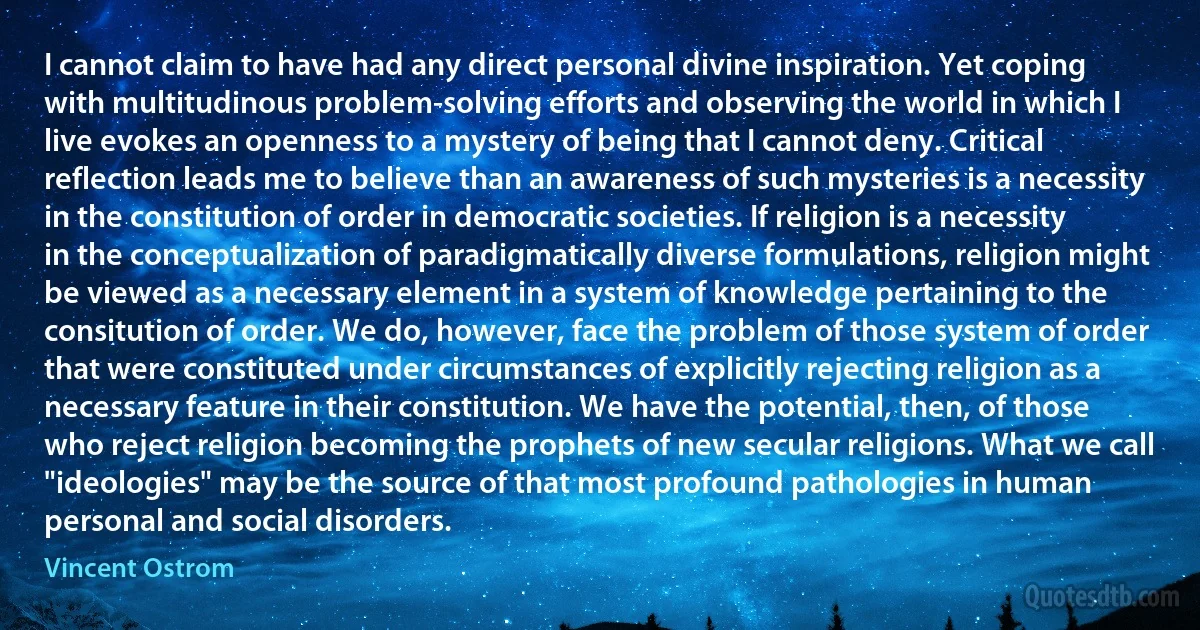
I cannot claim to have had any direct personal divine inspiration. Yet coping with multitudinous problem-solving efforts and observing the world in which I live evokes an openness to a mystery of being that I cannot deny. Critical reflection leads me to believe than an awareness of such mysteries is a necessity in the constitution of order in democratic societies. If religion is a necessity in the conceptualization of paradigmatically diverse formulations, religion might be viewed as a necessary element in a system of knowledge pertaining to the consitution of order. We do, however, face the problem of those system of order that were constituted under circumstances of explicitly rejecting religion as a necessary feature in their constitution. We have the potential, then, of those who reject religion becoming the prophets of new secular religions. What we call "ideologies" may be the source of that most profound pathologies in human personal and social disorders.
Vincent OstromRelated topics
becoming believe call claim coping democratic divine element face feature human knowledge live might necessary necessity openness order pertaining problem reflection religion secular source under world yet circumstances awarenessRelated quotes
The Machine Age's commitment to cause and effect was the source of many dilemmas, including the one involving free will. At the turn of the century the American philosopher E. A. Singer, Jr., showed that science had, in effect, been cheating. It was using two different relationships but calling both cause and effect. He pointed out, for example, that acorns do not cause oaks because they are not sufficient, even though they are necessary, for oaks. An acorn thrown into the ocean, or planted in the desert or an Arctic ice cap does not yield an oak. To call the relationship between an acorn and an oak ‘probabilistic' or ‘non deterministic causality,' as many scientists did, was cheating because it is not possible to have a probability other than 1.0 associated with a cause; a cause completely determines its effect. Therefore, Singer chose to call this relationship ‘producer-product' and to differentiate it from cause-effect.

Russell L. Ackoff
Needless to say, the history of the United States has been marred from its inception by an enormous quantity of unjust laws, far too many expressly bolstering the oppression of Black people. Particularized reflections of existing social inequities, these laws have repeatedly borne witness to the exploitative and racist core of the society itself. For Blacks, Chicanos, for all nationally oppressed people, the problem of opposing unjust laws and the social conditions which nourish their growth, has always had immediate practical implications. Our very survival has frequently been a direct function of our skill in forging effective channels of resistance. In resisting, we have sometimes been compelled to openly violate those laws which directly or indirectly buttress our oppression. But even when containing our resistance within the orbit of legality, we have been labeled criminals and have been methodically persecuted by a racist legal apparatus.

Angela Davis
Indeed, over the years I have had many a good laugh at the pompous moralism and blatant dishonesty of India's so-called secularists. Their specialty is to justify double standards, e. g. why mentioning murdered Kashmiri Pandits is "communal hate-mongering” while the endless litany about murdered Gujarati Muslims is "secular consciousness-raising”. Sometimes they merely stonewall inconvenient information, such as when they tried to deny and suppress the historical data about the forcible replacement of a Rama temple in Ayodhya by a mosque: given the strength of the evidence, all they could do was to drown out any serious debate with screams and swearwords. But often they do bring out their specific talents at sophistry, such as when they argue that a Common Civil Code, a defining element of all secular states, is a Hindu communalist notion, while the preservation of the divinely-revealed Shari'a for the Muslims is secular. That's when they are at their best.

Koenraad Elst
In primitive society the rules of ceremonial purity observed by divine kings, chiefs, and priests agree in many respects with the rules observed by homicides, mourners, women in childbed, girls at puberty, hunters and fishermen, and so on. To us these various classes of persons appear to differ totally in character and condition; some of them we should call holy, others we might pronounce unclean and polluted. But the savage makes no such moral distinction between them; the conceptions of holiness and pollution are not yet differentiated in his mind. To him the common feature of all these persons is that they are dangerous and in danger, and the danger in which they stand and to which they expose others is what we should call spiritual or ghostly, and therefore imaginary. The danger, however, is not less real because it is imaginary; imagination acts upon man as really does gravitation, and may kill him as certainly as a dose of prussic acid.

James Frazer
They were now as a party engaged in carrying laboriously uphill the last few columns out of the Gladstonian quarry. ... Foremost among the tasks of Liberalism in the near future was the regeneration of rural life and the emancipation of the land of this country from the paralysing grip of an effete and unprofitable system. ... [The reports into rural life] were startling. When they were published they would prove conclusively that there were hundreds of thousands, if not millions, of men, women, and children dependent upon the land in this country and engaged in cultivating it, hardworking men and women, who were living under conditions with regard to wages, to housing, as well as hours of labour-conditions which ought to make this great Empire hang its head in shame that such things could be permitted to happen in any corner of its vast dominions, let alone in this country, the centre and source of all its glory.

David Lloyd George
